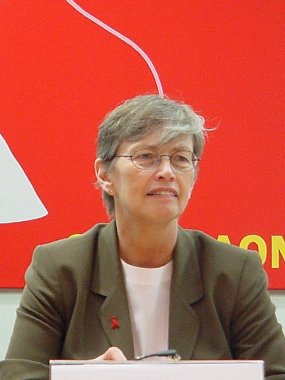
The State of the World's Children 2004, Remarks by Former Peace Corps Director Carol Bellamy
The State of the World's Children 2004, Remarks by Carol Bellamy
International Press Launch, Geneva
11 December 2003
Good afternoon and welcome.
I’m Carol Bellamy, Executive Director of UNICEF.
We are here today to talk about education. Specifically, the education of girls, which is the main theme of UNICEF’s flagship report, The State of the World’s Children.
It’s appropriate we are launching this report in Geneva. World leaders are here this week to talk about the information revolution, and about how the Internet and other communication technology is changing our world.
The ways in which these new technologies are harnessed to the goals of human development in poor countries is very important.
But there is something even more important. And that is a quality basic education for all boys and all girls, in every country.
The Internet has the potential to change people’s lives – but not if they can’t read. Not if they don’t understand basic math. Nothing prepares a child for engaging with the world – including the world on the Web – like basic learning and literacy.
It is a modern world we live in, with modern marvels and new frontiers of knowledge. But it is not modern for all of us. Here’s an astounding fact: There are still more than 120 million children every year who never see the inside of a classroom. The majority of these children are girls.
For these children, the world remains a very un-modern place indeed. Their lack of education is not only a tragedy for them, it is a lead weight holding back the progress of their nations.
Girls’ education has the power to change all this. That is why UNICEF is calling for the acceleration of efforts to get girls in school over the next two years. One of the Millennium Development Goals – agreed to by all nations – is that by the end of 2005, gender parity will be a reality in schools around the globe.
We need to push very hard to come close to reaching this goal. Even if we don’t quite get there, it is absolutely essential that we make a concerted and credible effort. As the first MDG target to come due, gender equality in the classroom is a basic test for all of us. Whether we pass this test will be a strong indicator of how serious we are about the entire development agenda.
In most places, gender equality in education means bringing down the barriers that keep girls out of school. There are currently 9 million more girls left out of school than boys. The good news is that when you bring down the barriers facing girls, schools become more welcoming places for all children, both boys and girls.
I want to make it clear that every boy and every girl has the right to a basic education. UNICEF is striving toward universal education by 2015 – another of the Millennium Goals. But making sure girls get their chance at an education has benefits far beyond the individual child.
The second part of The State of the World’s Children report is UNICEF’s yearly almanac of how children in every country are doing. The picture it presents – of education, child mortality, maternal mortality, nutrition, health, the impact of AIDS on children – is one of the best indicators you’ll ever find of what our collective future looks like.
It is our simple contention, backed up by empirical evidence and years of field experience, that educating girls would bring about major improvements in all of these basic indicators. From child death rates, to school completion, to HIV/AIDS – an educated girl grows up to be a woman who is better able to care for her children and family. We have the evidence that shows this..
This generational impact is so great that without an acceleration in educating girls, we think it’s likely that the world will fall short on all other development goals. There is simply no other investment that pays as many dividends as education – especially girls’ education.
That’s something that Nobel Peace Prize Winner Shirin Ebadi understands, and we are grateful for her long-standing friendship with UNICEF and her dynamic and courageous support of children’s rights.
It’s something that the UNICEF Representatives in Burkina Faso and Afghanistan understand, because they see what an impact educating girls – or not educating them – has had in their countries. The Swiss government understands, which is why Development Minister Walter Fust is with us today, as is the President of the UNICEF Executive Board, Ambassador Jeno Staehelin of Switzerland.
Most importantly, boys and girls themselves understand, and we are grateful to have two of them here today to tell the world why educating girls as well as boys is so important. I’m sure these bright youngsters, one from Uganda and one from Pakistan, would like to make use of the Internet as they pursue their dreams, and making sure they have the access to do that is important.
But they know, as we do, that a basic education must come first. In our world of marvels, how marvellous would it be if we could finally say that every girl and every boy was in school? That would truly be something to marvel at.
In a few minutes we’ll take your questions, but first I turn to my colleague Joan French, the UNICEF Representative in Burkina Faso, for a few words about a UNICEF initiative to accelerate gender parity in classrooms…
